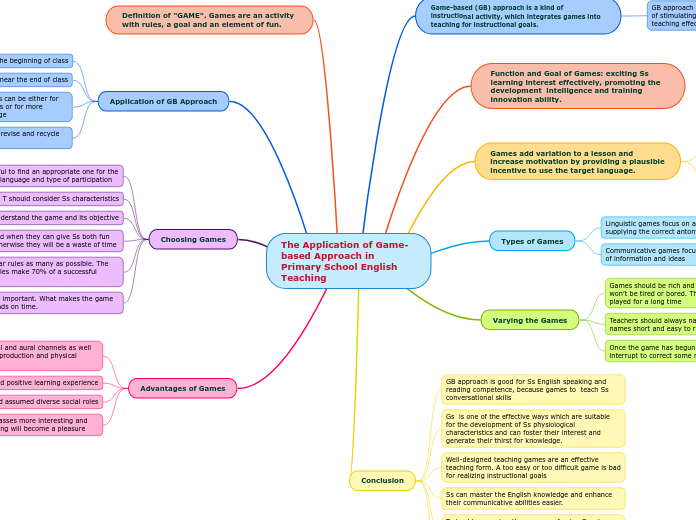The Application of Game-based Approach in Primary School English Teaching
Game-based (GB) approach is a kind of instructional activity, which integrates games into teaching for instructional goals.
GB approach is used in teaching English for purpose of stimulating Ss learning interests and improving teaching effect.
Function and Goal of Games: exciting Ss learning interest effectively, promoting the development intelligence and training innovation ability.
Games add variation to a lesson and increase motivation by providing a plausible incentive to use the target language.
Game-based approach in primary school English teaching does not only make the students joyful, but also make them full of wit and humor.
Interest is the best teacher for children
Types of Games
Linguistic games focus on accuracy, such as supplying the correct antonym
Communicative games focus on successful exchange of information and ideas
Varying the Games
Games should be rich and varied so that children won’t be tired or bored. The best games cannot be played for a long time
Teachers should always name the games. Make the names short and easy to remember.
Once the game has begun, the teacher should not interrupt to correct some mistakes in language use.
Conclusion
GB approach is good for Ss English speaking and reading competence, because games to teach Ss conversational skills
Gs is one of the effective ways which are suitable for the development of Ss physiological characteristics and can foster their interest and generate their thirst for knowledge.
Well-designed teaching games are an effective teaching form. A too easy or too difficult game is bad for realizing instructional goals
Ss can master the English knowledge and enhance their communicative abilities easier.
T should remember the purpose of using Gs, choose the proper teaching games and select suitable time to use them. Gs should be multi-leveled or should be in the hierarchy of difficulty.
Ts should encourage all the Ss to take part in the games in order to let all of them experience the success and keep their enthusiasm in learning.
Definition of "GAME". Games are an activity with rules, a goal and an element of fun.
Application of GB Approach
warm-up at the beginning of class
fill-ins when there is extra time near the end of class
in the PPP framework, the games can be either for practicing specific language items or for more communicative output of language
Gs can also be used as a way to revise and recycle previously taught language
Choosing Games
T should be careful to find an appropriate one for the class in terms of language and type of participation
T should consider Ss characteristics
T should understand the game and its objective
Gs should be used when they can give Ss both fun and education otherwise they will be a waste of time
T should give clear rules as many as possible. The understanding rules make 70% of a successful activity
Time limitation is important. What makes the game interesting depends on time.
Advantages of Games
Gs are using both visual and aural channels as well as activating language production and physical movement
G provides active and positive learning experience
Ss learn to imitate and assumed diverse social roles
Gs can make English classes more interesting and easier, so English learning will become a pleasure
